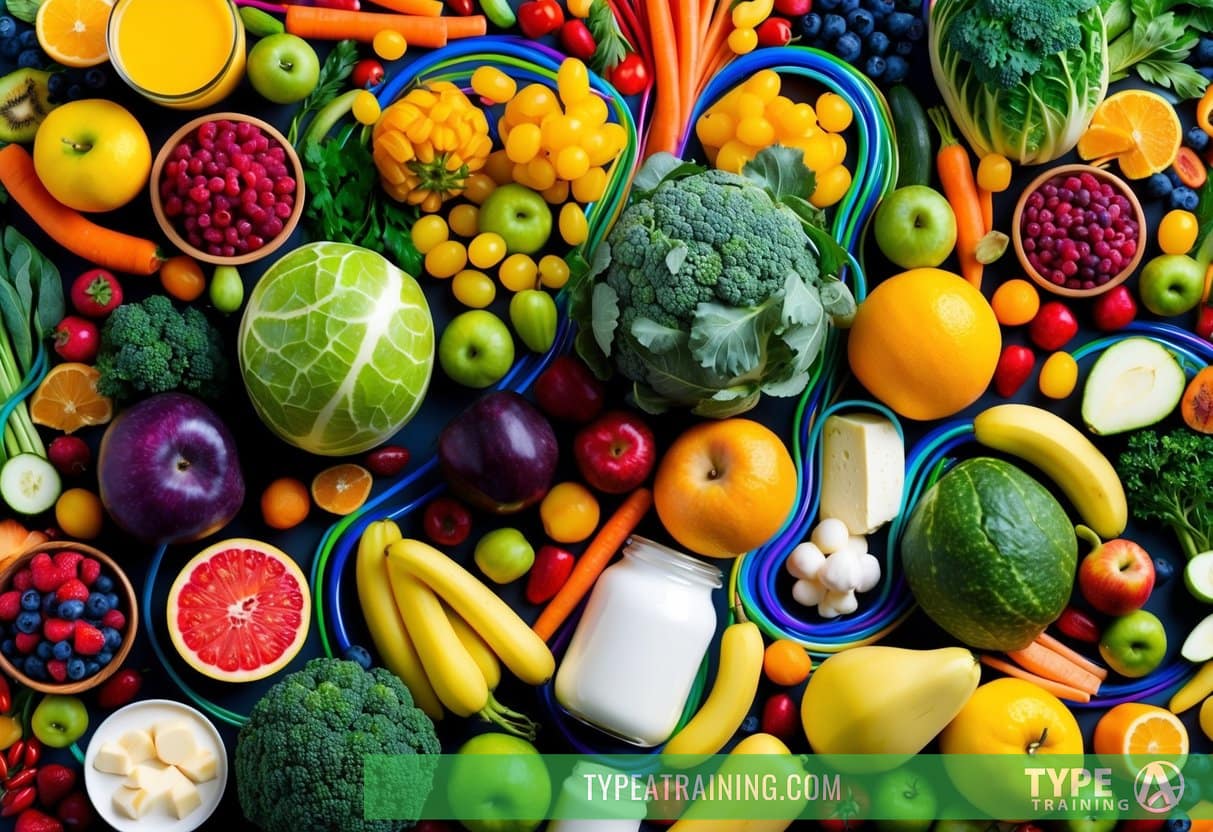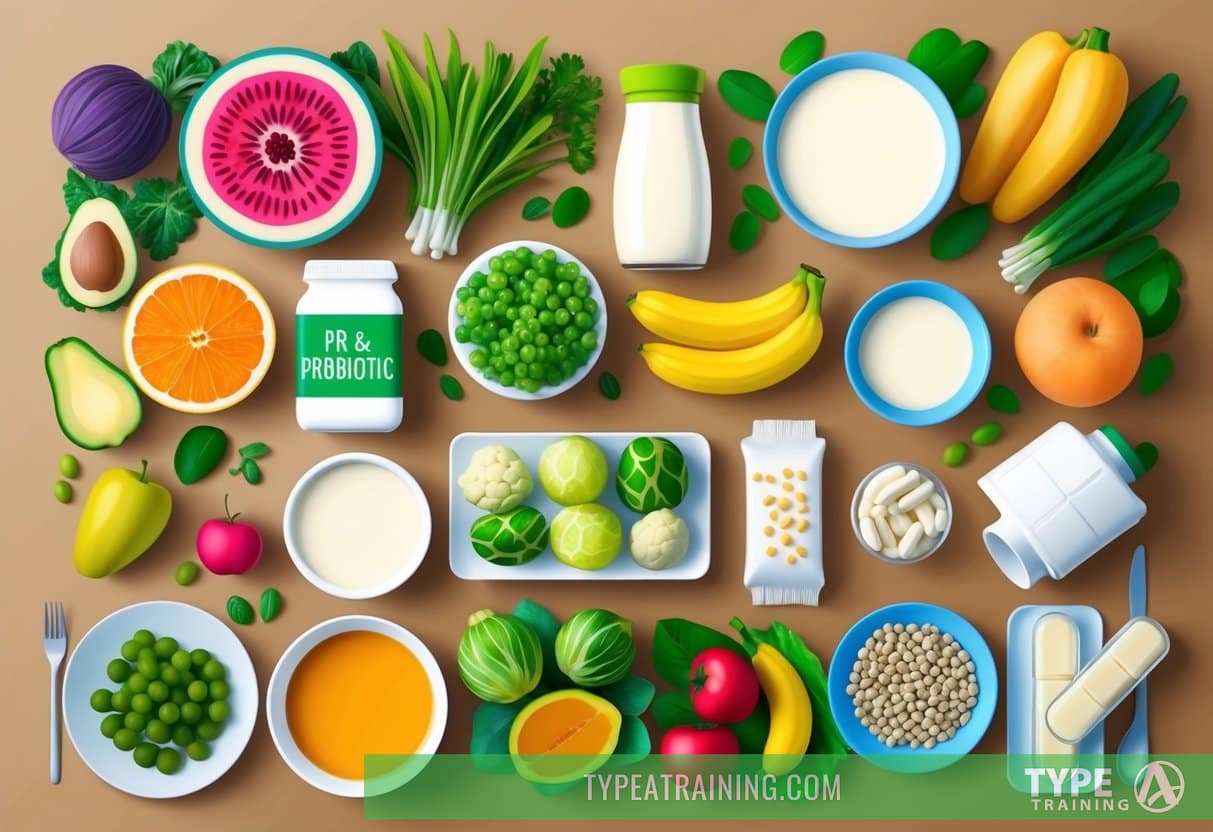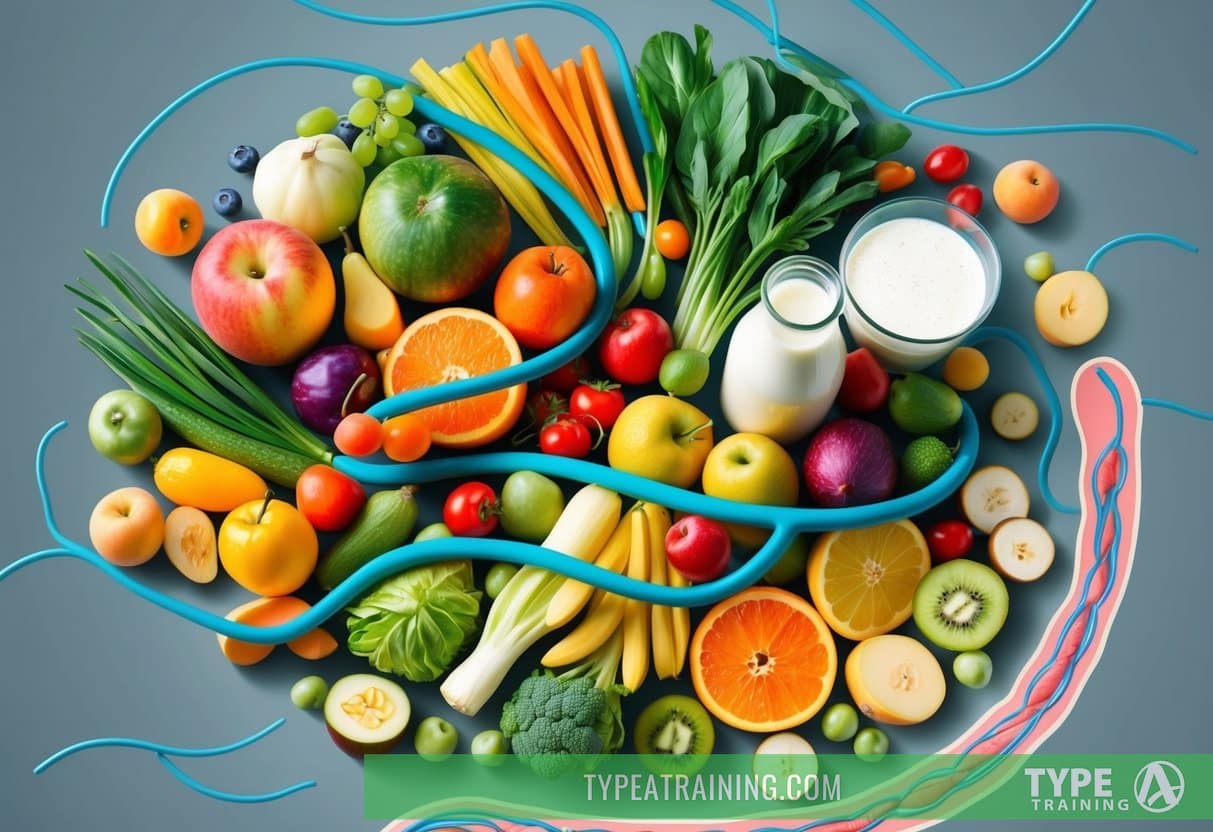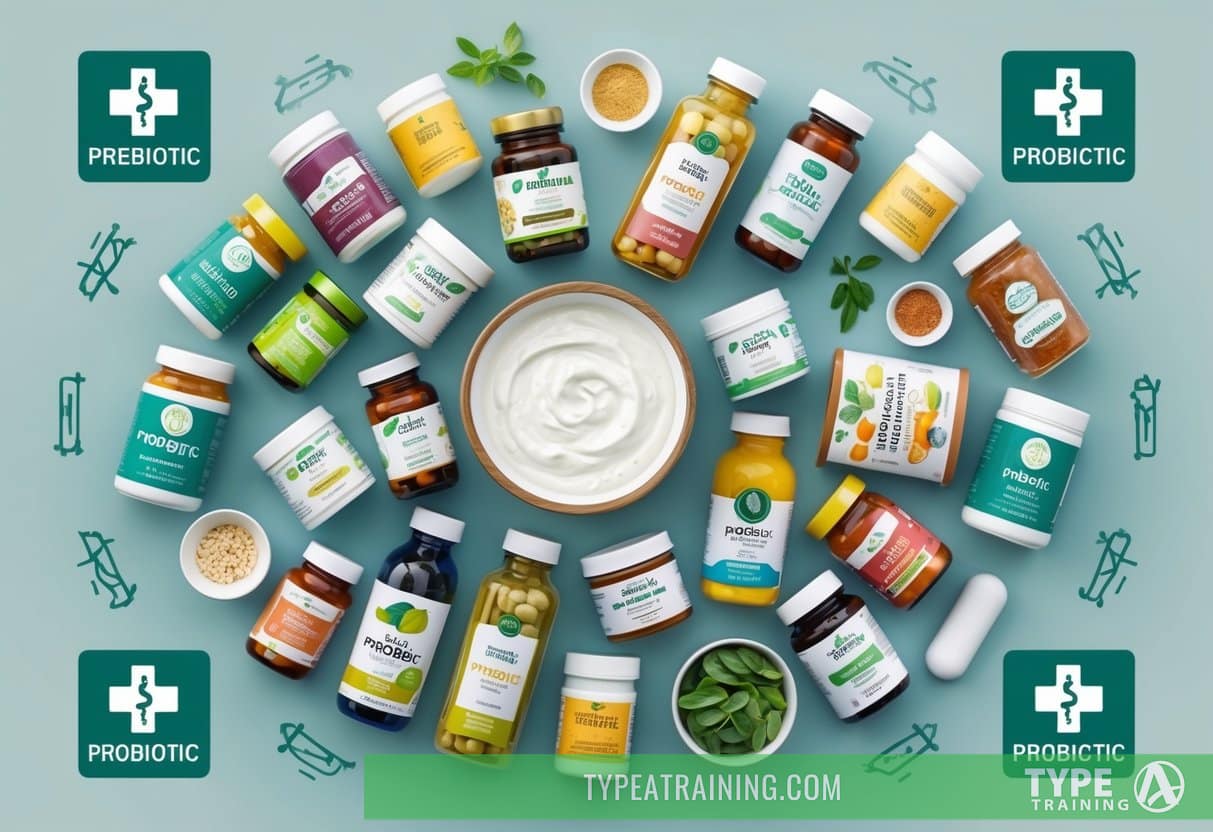Prebiotics and probiotics play crucial roles in maintaining a healthy gut microbiome. While they sound similar, these two components serve distinct functions in supporting digestive health and overall well-being.

Probiotics are found in certain foods and supplements, containing live bacteria that can boost the population of beneficial microorganisms in your gut. On the other hand, prebiotics are typically high-fiber foods that nourish the existing good bacteria in your intestinal tract.
Understanding the difference between prebiotics and probiotics can help you make informed decisions about your diet and supplementation.
Popular posts:
By incorporating both into your daily routine, you can support a thriving gut microbiome, which may lead to improved digestive health, enhanced immune function, and potentially even better mood regulation.
Key Takeaways
- Prebiotics feed beneficial gut bacteria, while probiotics are live microorganisms that support digestive health.
- Incorporating both prebiotics and probiotics in your diet can promote a healthy gut microbiome.
- A balanced gut microbiome may contribute to improved digestion, stronger immunity, and potentially better mental health.
Understanding Prebiotics and Probiotics

Prebiotics and probiotics play crucial roles in maintaining your gut health and overall well-being. These components work together to support a thriving microbiome in your digestive system.
Definitions and Differences
Probiotics are live microorganisms that provide health benefits when consumed in adequate amounts. They include beneficial bacteria like Lactobacillus and Bifidobacterium species.
Prebiotics, on the other hand, are non-digestible food components that feed and promote the growth of these beneficial bacteria in your gut. They are typically forms of dietary fiber or resistant starch.
The key difference lies in their function: probiotics are the actual microorganisms, while prebiotics serve as their food source.
The Role in the Gut Microbiome
Your gut microbiome consists of trillions of microorganisms, including bacteria, fungi, and viruses.
Probiotics contribute to this ecosystem by introducing beneficial bacteria.
These good bacteria help maintain a balanced microbiome, which is essential for:
- Proper digestion
- Nutrient absorption
- Immune system support
- Protection against harmful pathogens
Prebiotics nourish the existing beneficial bacteria in your gut, helping them thrive and multiply. This process enhances the overall health and diversity of your microbiome.
Sources of Prebiotics and Probiotics
Probiotics can be found in various fermented foods such as:
- Yogurt
- Kefir
- Sauerkraut
- Kimchi
- Kombucha
You can also obtain probiotics through dietary supplements, which often contain specific strains of beneficial bacteria.
Prebiotic sources include:
- Whole grains
- Bananas
- Onions
- Garlic
- Artichokes
- Asparagus
- Leeks
Inulin, a type of prebiotic fiber, is naturally present in many of these foods.
By incorporating a variety of these probiotic and prebiotic sources into your diet, you can support a healthy gut microbiome.
Health Benefits of Prebiotics and Probiotics
Prebiotics and probiotics offer numerous health benefits by supporting your gut microbiome and overall well-being. They work together to enhance digestive function, boost immunity, reduce inflammation, and even impact your mental health.
Digestive Health Improvement
Prebiotics and probiotics play a crucial role in maintaining a healthy gut. They support the growth of beneficial bacteria in your gastrointestinal tract, improving overall digestive function.
Probiotics introduce friendly bacteria directly into your gut, helping to restore balance in cases of dysbiosis. These live microorganisms can alleviate symptoms of digestive issues like bloating, constipation, and diarrhea.
Prebiotics, on the other hand, serve as food for your existing gut bacteria. They promote the production of short-chain fatty acids, which nourish your intestinal cells and enhance nutrient absorption.
By maintaining a diverse and balanced gut microbiota, prebiotics and probiotics can improve your digestive health and reduce the risk of gastrointestinal disorders.
Immune System Support
Your gut plays a significant role in your immune function.
Prebiotics and probiotics can strengthen your immune system by supporting a healthy gut microbiome.
Probiotics stimulate the production of antibodies and enhance the activity of immune cells. This boost in immunity can help your body fight off pathogens more effectively.
Prebiotics indirectly support immunity by promoting the growth of beneficial bacteria. These bacteria produce compounds that regulate immune responses and protect against harmful microorganisms.
Regular consumption of prebiotics and probiotics can reduce your susceptibility to infections and help you recover faster when illness does occur.
Inflammation and Chronic Diseases
Prebiotics and probiotics have shown promise in reducing inflammation throughout your body. This anti-inflammatory effect can help prevent and manage various chronic diseases.
Certain probiotic strains can decrease inflammatory markers in your blood. This reduction in systemic inflammation may lower your risk of conditions like heart disease, diabetes, and obesity.
Prebiotics support the production of short-chain fatty acids, which have anti-inflammatory properties. These compounds can help protect against inflammatory bowel diseases and other gastrointestinal disorders.
By maintaining a balanced gut microbiome, prebiotics and probiotics may also reduce the risk of autoimmune diseases and allergies.
Mental Health and Gut-Brain Axis
The gut-brain axis connects your digestive system to your central nervous system. Prebiotics and probiotics can influence this connection, potentially impacting your mental health.
Probiotics may help alleviate symptoms of anxiety and depression. Certain strains have been shown to reduce stress-related hormones and improve mood.
Prebiotics support the production of neurotransmitters in your gut, which can affect brain function and behavior. These compounds may help regulate sleep patterns and reduce stress levels.
By promoting a healthy gut microbiome, prebiotics and probiotics can contribute to better cognitive function and emotional well-being.
Common Food Sources and Supplements
Pre- and probiotics are readily available in various foods and supplements. These sources can help support your gut health and overall well-being when incorporated into your diet.
Fermented Foods and Their Role
Fermented foods are excellent sources of probiotics. Yogurt is a popular option, containing live and active cultures that benefit your digestive system. Kefir, a fermented milk drink, offers similar benefits and is often well-tolerated by those with lactose intolerance.
Sauerkraut and kimchi, both fermented cabbage dishes, provide a tangy flavor and probiotic boost. Kombucha, a fermented tea, has gained popularity for its potential health benefits and unique taste.
Cheese can also be a source of probiotics, particularly aged varieties like cheddar and gouda. Miso, a fermented soybean paste common in Japanese cuisine, is another probiotic-rich food to consider adding to your meals.
Dietary Supplements
Probiotic supplements come in various forms, including capsules, powders, and liquids. These supplements contain specific strains of beneficial bacteria designed to support gut health.
When choosing a supplement, look for products with:
- Multiple strains of bacteria
- A high number of colony-forming units (CFUs)
- Proper storage instructions
Synbiotics are supplements that combine both probiotics and prebiotics, offering a comprehensive approach to gut health.
It’s important to consult with your healthcare provider before starting any new supplement regimen, especially if you have underlying health conditions.
Natural Sources of Prebiotics
Prebiotics are naturally found in many plant-based foods. These compounds feed the beneficial bacteria in your gut, promoting their growth and activity.
Some excellent prebiotic food sources include:
- Bananas (especially when slightly underripe)
- Onions and garlic
- Leeks and asparagus
- Whole grains (oats, barley, wheat)
- Chicory root
Artichokes are particularly rich in prebiotics, making them a great addition to your diet. Soybeans and other legumes also contain prebiotic fibers that support gut health.
Prebiotics and Probiotics in Diet Planning
Incorporating prebiotics and probiotics into your diet can significantly enhance your digestive health and overall well-being.
By focusing on specific food choices and combinations, you can optimize the benefits of these beneficial microorganisms.
Incorporating into a Balanced Diet
To include prebiotics in your meals, focus on high-fiber foods.
Whole grains, bananas, greens, onions, garlic, soybeans, and artichokes are excellent sources of prebiotics. Add asparagus, leeks, and Jerusalem artichokes to your vegetable rotation.
For probiotics, incorporate fermented foods like yogurt and sauerkraut into your diet. Kimchi, kefir, and kombucha are also rich in beneficial bacteria.
Try to include a prebiotic or probiotic food in each meal.
For breakfast, have oatmeal with banana slices. At lunch, add a side of sauerkraut to your sandwich. For dinner, serve a salad with dandelion greens and garlic dressing.
Avoiding Overprocessed Foods
Highly processed foods often lack the fiber and nutrients that support a healthy gut microbiome. These foods can disrupt the balance of good bacteria in your digestive system.
Instead of packaged snacks, choose fresh fruits like bananas or apples.
Replace white bread with whole grain varieties. Swap sugary desserts for a serving of plain yogurt with fresh berries.
Be cautious with artificial sweeteners, as they may negatively impact gut bacteria.
Read food labels carefully and choose products with minimal added ingredients.
Cooking meals at home allows you to control the ingredients and preparation methods. This way, you can ensure you’re getting the most nutritional benefit from your food.
Combining for Optimal Effects
Pairing prebiotics and probiotics can enhance their effectiveness. This combination, known as synbiotics, can provide greater health benefits than either on its own.
Try these synbiotic combinations:
- Yogurt with banana slices
- Kefir smoothie with oats and berries
- Lentil soup with added garlic and onions
Include a variety of prebiotic foods in your diet to support different strains of beneficial bacteria.
Mix up your choices of both prebiotics and probiotics to ensure a diverse gut microbiome.
Consider timing your intake.
Some experts suggest consuming probiotics on an empty stomach, while others recommend taking them with a meal containing prebiotics.
If you’re considering dietary supplements, consult with a healthcare professional to determine the best options for your individual needs.
Adverse Effects and Considerations
While pre and probiotics offer many potential benefits, they can also cause side effects in some people. It’s important to be aware of possible interactions and take precautions, especially for certain groups.
Potential Side Effects
When you start taking prebiotics or probiotics, you may experience temporary digestive issues.
Gas, bloating, and constipation are common initial reactions. These typically subside within a few weeks as your body adjusts.
In some cases, probiotics may cause diarrhea. This is more likely if you have a compromised immune system or underlying gut issues like irritable bowel syndrome (IBS).
Rarely, probiotics might lead to infections in people with severely weakened immune systems.
If you have a serious illness, consult your doctor before starting probiotics.
Some probiotic foods contain biogenic amines, which can trigger headaches in sensitive individuals.
Interactions with Medications
Probiotics can interact with certain medications, potentially affecting their efficacy or increasing side effects.
- Antibiotics: Take probiotics at least 2 hours apart from antibiotics to avoid neutralization.
- Immunosuppressants: These may increase the risk of infection from probiotics.
- Antifungals: Can reduce the effectiveness of probiotics.
Some probiotic bacteria can also interfere with blood-thinning medications like warfarin.
Always inform your healthcare provider about any supplements you’re taking, including prebiotics and probiotics.
Precautions for Specific Populations
Certain groups should exercise caution when considering pre and probiotic supplements:
- Pregnant women: While generally safe, consult your doctor first.
- Infants and young children: Use only products specifically formulated for their age group.
- Elderly individuals: May be more susceptible to side effects; start with lower doses.
- People with inflammatory bowel disease: Probiotics might help, but could also exacerbate symptoms in some cases.
If you have a history of dysbiosis or are managing obesity, work with a healthcare provider to choose appropriate pre and probiotic products.
Those with compromised immune systems should avoid probiotics unless specifically recommended by their doctor due to increased infection risk.
Emerging Research and Future Perspectives
Recent advancements in pre- and probiotic research are opening new frontiers in health and nutrition. Scientists are exploring innovative approaches to harness the power of beneficial microbes for improved wellbeing.
Microbiome Therapy Development
Microbiome therapy shows promise as a novel treatment approach. Researchers are investigating how targeted probiotic strains can restore balance to disrupted gut ecosystems.
You may soon see personalized probiotic blends designed to address specific health conditions. These therapies aim to modulate the microbiome’s composition and function.
Emerging studies focus on identifying next-generation probiotics with enhanced therapeutic potential.
Scientists are exploring lesser-known bacterial strains and even non-bacterial microbes like yeasts and viruses.
Personalized Nutrition
Tailoring pre- and probiotic interventions to individual needs is gaining traction.
Your unique gut microbiome composition may influence how you respond to different dietary components.
Researchers are developing tools to analyze your gut microbiota and recommend personalized prebiotic and probiotic regimens.
This approach aims to optimize the beneficial effects of these interventions.
Future nutrition plans may incorporate microbiome-friendly foods and supplements based on your specific gut profile. This could help maximize the health benefits of pre- and probiotics for your individual needs.
Long-term Health Impact Studies
Scientists are conducting extensive research to understand the long-term effects of pre- and probiotic use. These studies aim to assess their impact on various aspects of health over extended periods.
Researchers are investigating how consistent probiotic consumption might influence:
- Chronic disease prevention
- Mental health and cognitive function
- Immune system strength
- Metabolic health
Clinical trials are being designed with improved methodologies to evaluate the sustained benefits of pre- and probiotics.
These studies consider factors like diet and existing gut microbiome composition to provide more accurate results.
Frequently Asked Questions
Prebiotics and probiotics play crucial roles in digestive health and overall wellbeing. Understanding their benefits, sources, and proper usage can help you optimize your gut microbiome and address common health concerns.
What are the benefits of taking prebiotics and probiotics together?
Taking prebiotics and probiotics together can enhance the effectiveness of both.
Prebiotics act as food for probiotics, helping them thrive in your gut.
This combination supports a healthy balance of gut bacteria, potentially improving digestion and nutrient absorption. It may also boost your immune system and promote better overall health.
How do prebiotics and probiotics contribute to weight management?
Prebiotics and probiotics can influence weight management by affecting your gut microbiome. They may help regulate appetite and metabolism.
Some studies suggest that certain probiotic strains can reduce fat storage and increase the feeling of fullness. However, more research is needed to fully understand their impact on weight.
What are the indicators that probiotics are positively affecting gut health?
Improved digestion is a key sign that probiotics are working. You may notice more regular bowel movements and reduced bloating or gas.
Other indicators include better nutrient absorption, stronger immunity, and improved mood. Some people also report clearer skin and increased energy levels.
Can the regular intake of prebiotics and probiotics have adverse effects?
While generally safe, some people may experience temporary digestive discomfort when starting prebiotics or probiotics.
This can include gas, bloating, or changes in bowel habits.
If you have a compromised immune system or severe illness, consult your healthcare provider before starting these supplements. Adverse effects are rare but possible.
What are some examples of foods high in prebiotics and probiotics?
Probiotic-rich foods include fermented items like yogurt, kefir, sauerkraut, and kimchi. These contain live beneficial bacteria.
Prebiotic foods are typically high in fiber. Examples include garlic, onions, leeks, asparagus, bananas, and whole grains. These foods nourish the good bacteria in your gut.
What signs suggest an individual might need to increase their prebiotic intake?
Frequent digestive issues like constipation or diarrhea may indicate a need for more prebiotics. Weak immune function or recurring infections could also be signs.
If you’re experiencing unexplained fatigue or mood swings, increasing your prebiotic intake might help. A balanced diet rich in diverse plant foods naturally provides prebiotics.





